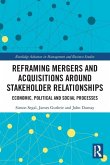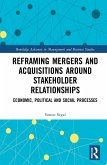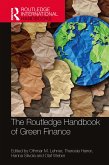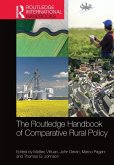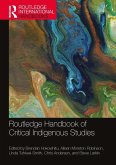Meaningful Stakeholder Engagement (MSE) is both a concept and a management approach, drawing on a combination of theoretical and applied knowledge areas (e.g., impact assessment, business and human rights, and stakeholder theory). MSE has become a key element of corporate sustainability risk-based due diligence as a process that responsible business enterprises are expected to apply to identify and manage harmful impacts on the environment and society.
Despite the obvious and growing relevance of meaningful stakeholder engagement, few publications have tried to synthesize the knowledge, academic literature, and practical experience within and around the concept and practices. This volume responds to that knowledge gap through the provision of comprehensive interdisciplinary perspectives. Embodying a rights-holder orientation, The Routledge Handbook on Meaningful Stakeholder Engagement emphasizes the importance of MSE for stakeholders who are or can be affected by activities driven by external actors, such as natural resource extraction or processing; infrastructure; development proposals, planning and implementation; and production for industry or consumption.
This handbook offers four thematic sections, all interdisciplinary in character, seeking to explore the multiple aspects of MSE. Moreover, a comprehensive introductory chapter explains key elements of the concept and causes for the current surge in expectations of MSE, including a rise in demands of risk-based due diligence. More than 40 international contributors combine theory and practice in chapters that discuss and elaborate the theory and practice of MSE. Uniquely, each section includes short practice notes based on experiences or dilemmas lived by practitioners or affected people, placing real-life situations into theoretical context. The concluding chapter draws up key insights from the chapters and practice notes, and casts a path for the future of MSE integrating values, norms, and practice.
Cutting across multiple disciplines including stakeholder theory, natural resource management, impact assessment, project management, ESG, responsible business, and global value chains, The Routledge Handbook on Meaningful Stakeholder Engagement will be an essential resource for scholars, researchers, developers, investors, affected people, civil society organizations, students, and others.
The Open Access version of this book, available at http://www.taylorfrancis.com, has been made available under a Creative Commons Attribution-Non Commercial-No Derivatives (CC-BY-NC-ND) 4.0 license.
Despite the obvious and growing relevance of meaningful stakeholder engagement, few publications have tried to synthesize the knowledge, academic literature, and practical experience within and around the concept and practices. This volume responds to that knowledge gap through the provision of comprehensive interdisciplinary perspectives. Embodying a rights-holder orientation, The Routledge Handbook on Meaningful Stakeholder Engagement emphasizes the importance of MSE for stakeholders who are or can be affected by activities driven by external actors, such as natural resource extraction or processing; infrastructure; development proposals, planning and implementation; and production for industry or consumption.
This handbook offers four thematic sections, all interdisciplinary in character, seeking to explore the multiple aspects of MSE. Moreover, a comprehensive introductory chapter explains key elements of the concept and causes for the current surge in expectations of MSE, including a rise in demands of risk-based due diligence. More than 40 international contributors combine theory and practice in chapters that discuss and elaborate the theory and practice of MSE. Uniquely, each section includes short practice notes based on experiences or dilemmas lived by practitioners or affected people, placing real-life situations into theoretical context. The concluding chapter draws up key insights from the chapters and practice notes, and casts a path for the future of MSE integrating values, norms, and practice.
Cutting across multiple disciplines including stakeholder theory, natural resource management, impact assessment, project management, ESG, responsible business, and global value chains, The Routledge Handbook on Meaningful Stakeholder Engagement will be an essential resource for scholars, researchers, developers, investors, affected people, civil society organizations, students, and others.
The Open Access version of this book, available at http://www.taylorfrancis.com, has been made available under a Creative Commons Attribution-Non Commercial-No Derivatives (CC-BY-NC-ND) 4.0 license.
"How wonderful to have a book written with an unashamedly normative focus on meaningful engagement with affected stakeholders. And how necessary that this book is not just conceptually rigorous but immersed in practice and with a global reach. Kudos to the authors. I will be pulling The Routledge Handbook on Meaningful Stakeholder Engagement off my shelf for many years to come."
Professor Michelle Greenwood, Monash Business School, Monash University
"This is one of the most welcome contributions to the business and human rights scholarship since the UN Guiding Principles themselves. The theoretical and practical assessments of a BHR concept as pivotal as meaningful stakeholder engagement in this book provides the sort of invaluable knowledge that every stakeholder needs for realizing the ideals of the UNGPs."
Professor Michael K. Addo, University of Notre Dame Law School; former Member of the UN Working Group on Business and Human Rights
"The term 'stakeholder' burst onto the corporate responsibility scene in the mid-1980s. Widely used, but rarely theorized, this volume focuses the analytical lens on the concept itself. Brimming with ideas, the various chapters (and practice notes) explore the challenges associated with powerful actors categorizing affected stakeholders to 'engage' with them 'meaningfully'. Readers are urged to reflect on the origins of these three concepts and the implications of their interaction across an expansive range of sectors and research settings."
Professor Deanna Kemp, The University of Queensland
Professor Michelle Greenwood, Monash Business School, Monash University
"This is one of the most welcome contributions to the business and human rights scholarship since the UN Guiding Principles themselves. The theoretical and practical assessments of a BHR concept as pivotal as meaningful stakeholder engagement in this book provides the sort of invaluable knowledge that every stakeholder needs for realizing the ideals of the UNGPs."
Professor Michael K. Addo, University of Notre Dame Law School; former Member of the UN Working Group on Business and Human Rights
"The term 'stakeholder' burst onto the corporate responsibility scene in the mid-1980s. Widely used, but rarely theorized, this volume focuses the analytical lens on the concept itself. Brimming with ideas, the various chapters (and practice notes) explore the challenges associated with powerful actors categorizing affected stakeholders to 'engage' with them 'meaningfully'. Readers are urged to reflect on the origins of these three concepts and the implications of their interaction across an expansive range of sectors and research settings."
Professor Deanna Kemp, The University of Queensland


